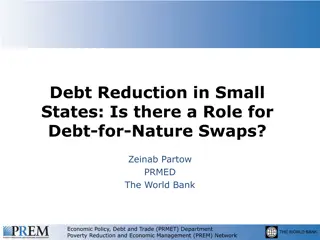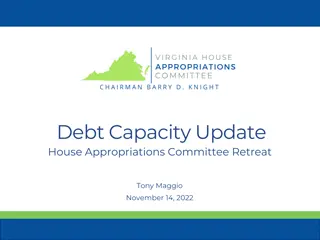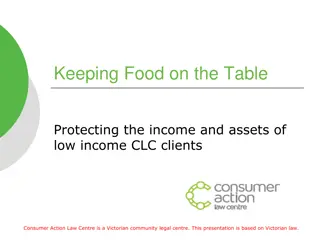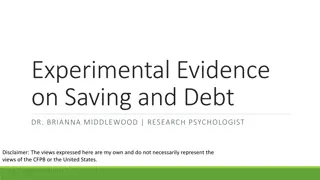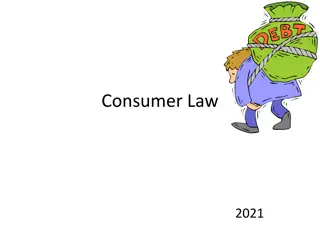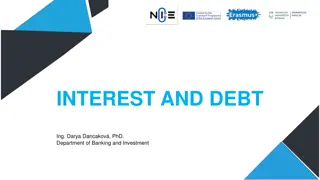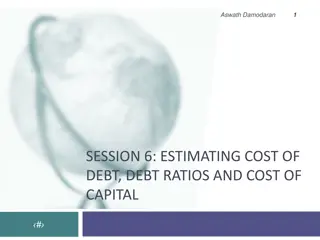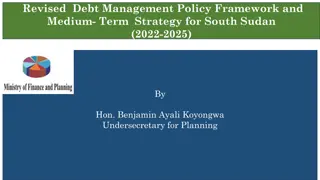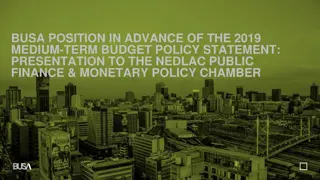Understanding the Impact of Debt Collection Laws in South Africa
The content discusses the implications of a proposed amendment to debt collection laws in South Africa, focusing on the financial impact on consumers. It provides background information on debt collection history, the role of the Council for Debt Collectors, and changes in regulations over the years. The amendment highlights concerns about consultation with stakeholders and the distinction between defaulting on debts like home loans and rent. The article also touches on the legal framework for debt recovery before and after 2003.
Download Presentation

Please find below an Image/Link to download the presentation.
The content on the website is provided AS IS for your information and personal use only. It may not be sold, licensed, or shared on other websites without obtaining consent from the author. Download presentation by click this link. If you encounter any issues during the download, it is possible that the publisher has removed the file from their server.
E N D
Presentation Transcript
PORTFOLIO COMMITTEE ON HUMAN SETTLEMENTS 4 SEPTEMBER 2018
OPPORTUNITY TO ADDRESS The Council is grateful for this opportunity to raise an issue in the new bill that will have a devastating financial impact on South African consumers
AMENDMENT Repeal and amendment 76. The laws mentioned in Schedule 1 are hereby repealed or amended to the extent set out in the third column of that Schedule. Schedule 1 (Section 75) LAWS REPEALED OR AMENDED Act No. and Year Act No. 112 of 1976 Short Title Estate Agency Affairs Act, 1976 Debt Collectors Act, 1998 Extent of amendment or repeal The whole Act No. 114 of 1998 Amendment of section 1 by the substitu- tion for paragraph (a) of the definition of debt collector of the following paragraph: (a) a person, other than an attorney or his [or], her or its employee or a party to a factoring arrange- ment or a property practitioner as defined in section 1 of the Property Practitioners Act, 2018, who for reward collects debts owed to another on the latter s behalf. . Even though the Debt Collectors Act is being changed the Council was never consulted or engaged as a stakeholder as can be seen from paragraph 4 of the proposed Bill
BACKGROUND ON THE HISTORY OF DEBT COLLECTION The Magistrates Court Act defines a debt as an amount that is due and payable (owed and not paid). Simply put: If you can be sued for an amount it is a debt; if not, then it is an obligation. Debt collection is big business with consumer debts exceeding one trillion rand in total and the industry recovering over 30 billion rand a year. Collection is done through 18 000 registered debt collectors. There are many types of debts: - credit cards - store cards - school university fees, - medical bills, - bond defaults, - rentals or levies not being paid, - municipal debts, etc . This amendment implies that there is a difference between defaulting on a home loan and owing the bank, and defaulting on arrear rent payable and owing the landlord.
RECOVERY OF DEBTS BEFORE 2003 The recovery of fees and expenses for all debts is regulated by the Magistrates Court Act. No other act may authorize the recovery of fees for a debt. This right is contained in section 60 of that Act. Section 60 Prohibition of recovery of fees or remuneration by certain persons in connection with the collection of debts unless expressly otherwise provided in this act or the rules no person other than an attorney or an agent referred to in section 22 shall be entitled to recover from the debtor any fees or remuneration in connection with the collection of any debt. It is clear that no one was entitled to recover any fees from a debtor for the recovery of a debt other than an attorney. The legal route was too expensive and too time consuming; a change was required. That change was the creation of a statutory regulator named the Council for Debt Collectors.
RECOVERY OF DEBTS AFTER 2003 Parliament through Act 114 of 1998 created the Council for Debt Collectors, enabling registered debt collectors to charge fees for the recovery of debts. This necessitated an amendment of section 60 of the Magistrates Court Act for debt collectors and much later also for debt councillors. Section 60 Prohibition of recovery of fees or remuneration by certain persons in connection with the collection of debts (1) unless expressly otherwise provided in this Act or the rules and the National Credit Act 2005 and subject to the provisions of section 19 of the Debt Collectors Act, 1998 no person other than an attorney or an agent referred to in section 22 or a person authorised by or under the provisions of the National Credit Act, 2005, to do so shall be entitled to recover from the debtor any fees or remuneration in connection with the collection of any debt. (2)any person who contravenes any provision of subsection (1) shall be guilty of an offence and on conviction be liable to a fine not exceeding R4000 or, in default of payment to imprisonment for a period not exceeding 12 months, or to both such fine and such imprisonment. There is no such provision in the Magistrates Court Act for property practitioners.
THE DEBT COLLECTORS ACT The purpose of the act is twofold: 1. To exercise control over the occupation of debt collecting 2. To legalise the recovery of fees or remuneration by registered debt collectors from debtors. The Act is assisted by regulations and a code of conduct that debt collectors must adhere to in the collection of any debts. Definition of a debt collector is contained in section 1 and 8 of the Act. In brief, a debt collector is: - a person - who for reward collect debts - owed to another person - on the latter s behalf.
THE DEBT COLLECTORS ACT Attorneys or their employees are excluded from the Act. Attorneys had their own fee structures as contained in the Magistrates Court Act and their own regulator enforcing those fees. It is clear that the legislature wanted to exclude attorneys but not managing agents from the Debt Collectors Act, otherwise it would have done so; reason probably being that there was no fee structure or framework to regulate property managers. The new Act also does not provide for any fee structure or framework. Failure to register as a debt collector is a criminal offence and is on conviction liable to a fine or to imprisonment for a period not exceeding three (3) years.
THE DEBT COLLECTORS ACT Debt collectors fees are set out and regulated by Section 19 which states that a debt collector may only recover: a) The capital b) Interest legally due c) The fees as approved and authorised by the Minister and set out in Annexure B of the Debt Collectors Act
The total amount to be recovered from the debtor in respect of items 1 to 7 of the Annexure shall not exceed the capital amount of the debt or R965,00, whichever is the lesser. Item Description Amount 1.(a) Necessary ordinary letter, registered letter, facsimile or e-mail: R 20,00 (and in the case of a registered letter, the costs of the registration fee to be added). 1.(b) Registered letter (section 57 of the Magistrates' Courts Act, 1944 (Act No. 32 of 1944)): The amount as prescribed from time to time in item 8 of Annexure 2, Table A, Part II of the Rules Regulating the Conduct of the Proceedings of the Magistrates' Courts of South Africa. DEBT COLLECTORS ACT Necessary electronic communication, other than facsimile or e-mail, (per electronic communication): 1.(c) R2,80 (maximum of ten electronic communications per month). 2. Necessary phone call, which is not a consultation (per call): R 20,00 3. Other necessary expenses not specifically provided for, a total amount of: R20,00. 4.(a) Acknowledgement of debt and undertaking to pay debt in terms of section 57 or section 58 of the Magistrates' Courts Act, 1944 (Act No. 32 of 1944) (including the necessary consultation with debtor): The amount as prescribed from time to time in items 9 and 10 of Annexure 2, Table A, Part II of the Rules Regulating the Conduct of the Proceedings of the Magistrates' Courts of South Africa. 4.(b) Original documents signed by the debtor under item 4(a) at the debtor s residence or place of work: R198,00. 4.(c) Necessary registered credit bureau search: R13,00 (maximum of four searches per month). 5. At the request of the debtor, the drawing up and furnishing of a settlement account, other than the six monthly settlement account: R39,00. 6. Correspondence received and attended to: R10,00. 7. Necessary consultation with debtor: R49,00. 8. Attending taxation: R78,00. 9. On receipt of an instalment (one or more) in redemption of the debt inclusive of instalments made directly to the client: A fee of 10% of the instalment received, subject to a maximum amount of R480. No additional fee shall be charged for any attendance in connection with the receipt or payment of any instalment.".
THE COUNCIL AND MANAGING AGENTS Managing agents for long held the belief that they were not debt collectors for arrear rent and levies and not bound by the limitation of fees contained in the Debt Collectors Act. They often referred to this collections as the goose that lays the golden eggs. Council received stacks of complaints against the fees and methods being used by these collectors and in 2007 decided to charge a managing agent (Brunello).
BRUNELLO PROPERTY MANAGEMENT This was the first managing agents charged in 2007 for not being a registered debt collector and charging fees not allowed for by the Debt Collectors Act a) telephone calls in the amount of R55.00 each (debt collectors could charge R12.00) b) letters of demand in the amount of R125.00 (debt collectors could charge R12.00) c) letters i.r.o. rules or collection in the amount of R175.00 (debt collectors could charge R12.00) d) letters i.r.o. rules or collection in the amount of R250.00 (debt collectors could charge R12.00) This exploitation of consumers ended with a guilty verdict and sentence and thereafter forced managing agents to comply with the fees and methods as stipulated by the Debt Collectors Act.
BRUNELLO PROPERTY MANAGEMENT The defendant attempted to using the management rules of body corporates as legal authority to determine and fix fees for managing agents: an owner shall be liable for and pay all legal costs, including costs as between attorney and client, collection commission, expenses and charges incurred by the body corporate in obtaining the recovery of arrear levies, or any other arrear amount due and owing by such to the body corporate, or in enforcing compliance with the rules, the conduct rules or the Act. In light of the provisions of section 60 of the Magistrates Court Act that argument was found invalid. The rule in any event stipulates and defines legal costs to which neither the body corporate nor a management agent would ever be entitled to.
APPLICATION FOR EXEMPTION After the Brunello judgement NAMA (National Association of Managing Agents) applied to the Minister of Justice for an exemption from the Debt Collectors Act. NAMA accepted the fact that managing agents at certain stages, when they recovered arrear rent and levies, were acting as debt collectors. The parties agreed that the recovery of arrear rent and levies for reward placed those managing agents squarely under the Debt Collectors Act. An agreement was reached between the parties to address some of the practical issues around the use of trust accounts and NAMA subsequently withdrew their application for exemption. Managing agents who collect arrear rent and levies for reward have been registered as debt collectors since then and have been complying with the prescribed fees and rules.
CONCERN 1 The Department of Justice has embarked on a process to remove the exclusion of attorneys from the Debt Collectors Act. Abuse of court processes and fees has necessitated their inclusion under the Debt Collectors Act. That amendment is already on the judicial program for the year. At a time when the protection of attorneys is being removed, the Property Practitioners Bill aims once again create an exemption from the Debt Collectors Act.
CONCERN 2 The Property Practitioners Bill makes no provision for any fee structure or enforcement process for the recovery of debts. It is standard legislative procedure that fees are prescribed by regulations promulgated in terms of an enabling act. However, here there is no enabling provision in the Property Practitioners Bill and any regulations promulgated in the absence of an appropriate enabling clause would be ultra vires. There is no provision made for a Code of Conduct for debt collection in the Bill. Section 61 creates no sanctionable offence for abuses when recovering debts. No change in Magistrates Court Act is provided resulting in every property practitioner collecting arrear rent and levies and charging a fee would then be committing a criminal offence.
CONCERN 3 The Debt Collectors Act specifically provides that it has jurisdiction over every person who is concerned with debt collecting. It is a criminal offence not to be registered and once registered the Act, Regulations and Code of Conduct are binding on such a person. The Property Practitioners Bill appears to exclude those employees who merely collect and receive monies payable on a lease. This in effect would mean that the employees demanding the arrear amounts would not be considered a property practitioner and fall outside the ambit of that Bill and would in effect then be unregulated.
CONCERN 4 The enactment of the debt collectors act emanated from a report by the law reform commission. The following was pointed out: - debt recovery by extra judicial institutions was a world wide phenomenon - rent and levies were pointed out as one of the causes of rising debt levels its recommendation resulted in the creation of the council for debt collectors. The provisions of the debt collectors act was crafted and aligned with the requirements to regulate the registration and activities of those who collect debts. The property practitioners bill is for different reasons and therefore not aligned with these requirements necessary to regulate the recovery of debt.
CONCERN 5 The fees charged and mechanisms used by managing agents once again becoming unregulated is a deeply concerning. At present the Council once it becomes aware of these type of abuses can act against such entities and enforce compliance. Since the possible option of not falling under the Council s jurisdiction in the near future we have started receiving fee abuse complaints once again from manging agents already starting to charge their own fees, for example: Complaint received for the following fees: -legal letter R240.00 (no such fee chargeable under the DCA) - cash deposit fees monthly charge (no such fee chargeable under the DCA) - arrear sms R18.50 (only allowed R2.20 per sms) - urgent notice R160.00 (only allowed R20.00) - arrear letter R85.00 (only allowed R20.00) - sms fee R5.00 (only allowed R2.20) - preparation for legal handover R513 (no such fee chargeable under the DCA) - statement fee R17.10 p/m (free statement ever y 6 months)
CONCLUSION The amendment will have a severe negative impact on consumers. The actions of managing agents and their employees as well as the fees they charge will become unregulated and lead to the exploitation of consumers who have fallen behind on the payment of rent and levies.




